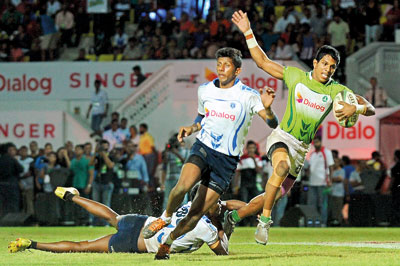Junior Rugby in extra time with no long whistle
View(s): 25, 23 26One may have thought with a sigh of relief that Schools Rugby is over at the end of the Under (U)-18 Rugby final. Not so, as they have to play other lower age groups, as well as Schools Division II games.
25, 23 26One may have thought with a sigh of relief that Schools Rugby is over at the end of the Under (U)-18 Rugby final. Not so, as they have to play other lower age groups, as well as Schools Division II games.
Spectators including parents ask whether the Juniors’ season is over, as this long ‘drag’ denies time for academic work. What they mean by the long ‘drag’ is that, the Juniors have been playing since April, as schools play Junior matches prior the 1st XV games, as friendlies.
The argument for a tournament is because it is only the top tier teams that play matches along with the top league games and, in the absence of a tournament, lesser fancied teams will not have sufficient fixtures. The ball is then back to the parents and schools, who then should opt not to play, and there will not be a ‘drag’. That too will not materialise, as some want to have a trophy to boost their ego.
In a society that encourages conspicuous attainment beginning from Grade 5 Scholarship exams, the need for a trophy cannot be overlooked. Then you got to blame yourself, because the system is a child of your greed.
Junior Rugby is all about developing skills, and has to be seriously looked at, while gradually introducing competition. It is not all about winning, which leads to setting bad examples, as adults get involved and start pointing fingers, if and when silverware is not brought home.
It is time schools balance a participating focus against a winning mentality, roundly developing a social atmosphere of camaraderie. This is an important part of Rugby culture that makes the sport such fun to participate in.
I have read, as well as heard, of the descent to Lankan soil of 2 Kiwis who are to improve the skills of coaches, especially those involved in schools. While appreciating the effort to hone schoolboy skills, the question is whether we are putting the cart before the horse because, do we have the structure for Junior Rugby, as well as a method for Long Term Player Development?
I would believe that it is important to have this in place and have experts helping the schools and the Union, while coaching skills are imparted. As I have said, to invest is important but, if it is not wisely done, it will remain just an expenditure, with only records being filled.
There is a need for a Guide, such as the one written by the RFU for young Rugby players and their parents and the number of advisors involved in channelling the young to Rugby. Some of which expressed in this column draws inspiration from the RFU Guide.

A Sevens competition for Under-18s at the recently held Sri Lanka Super 7s Series was a welcome factor
Yet, most are uncertain of how this may fit with continuing one’s education and a long term career beyond the sport. For almost all young players, the Rugby journey begins at school, which then, for some players, leads to National jerseys. U-20 School Rugby players are in excess of a thousand. Schools Rugby is played in almost 6 age groups, and the pool of Rugby interest may be close to 5,000.
Whilst pursuing the ambition of being involved in Rugby as a sport, young players and their parents will also be keen to ensure the academic pursuit is not compromised. The young player can expect the “support group” involved in their life to explore, discuss and find the balance that is right as an individual; the optimum balance that will maximise their Rugby ability whilst maximising their academic ability.
There are a number of opportunities and routes available for young players to find a balance that works for them personally, in their Rugby and academic development. What is required is to draw from “real -life” examples of past players who have achieved excellent results in professional, academic and sport.
The thinking has to revolve round long term player development and a strategy for peak performance. This not a just talking of a balance between Rugby and academic development, but also considering a need for balance among people who keep blaming others for a long-drawn season. In reality, the long-drawn season may be your own seeking. That includes parents and the various advisors that hover around the young athlete. If you take the U-18, it is a diluted tournament, as leading Rugby playing schools such as Royal, Wesley, St. Peters and S. Thomas’s kept away. If you have to tackle the need to have tournaments for the lesser known Rugby playing schools, why not concentrate on them. At least the teams in the top league can play the age group matches along with the U-20 games. The season will then not drag on, and other schools can start late to play in a tournament meant for them.
This also requires a change in mentality, especially, by those who want some silverware to crow about and/or post on social media. Read the hype created when a team wins a Bowl or a Plate. In reality, a Bowl means you are No. 9, while a Shield means you are No.13.
Vimal Perera is a former Rugby Referee, coach and Accredited Referees Evaluator IRB


